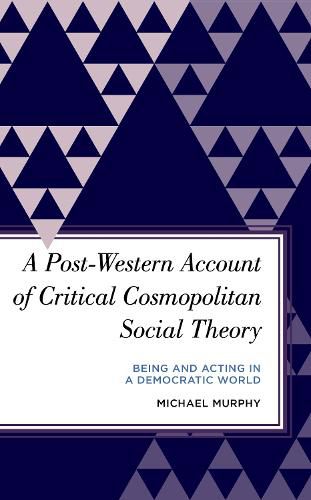Readings Newsletter
Become a Readings Member to make your shopping experience even easier.
Sign in or sign up for free!
You’re not far away from qualifying for FREE standard shipping within Australia
You’ve qualified for FREE standard shipping within Australia
The cart is loading…






In this book, Michael Murphy argues that if cosmopolitanism is to remain critical and relevant, rather than set out another grand project, what is required is a process of critique and cooperation. At the level of inter-cultural exchange, this requires understanding the encounter with the Other as a mutual phase of development and holds out the potential to rejuvenate world philosophies.Through this process the cosmopolitan imagination emerges from a dialogue between global traditions of relational sociologies on matters of common concern.
The second stage of the book applies this methodology to provide a radical account of being and acting in the world. This will be achieved through engaging in conversation with the works of the critical theorist Gerard Delanty, the decolonial theorist Walter Mignolo, and the Buddhist, Confucian, and phenomenological inspired work of Watsuji Tetsuro. In providing a move away from abstractions and ideals to instead focus on injustices and the everyday life, Murphy uncovers an independent source for political legitimacy not defined by the rationality of the state or dependent on the ideals of Western philosophy. Part of this investigation also reveals a post-individual account of agency as an enactive being. Emphasising agency as becoming has the potential to allow us to reimagine the relationship between the self and the institutions of democracy. The main themes of this book are eurocentrism, critical cosmopolitanism, post-individual subjectivity and democracy.
$9.00 standard shipping within Australia
FREE standard shipping within Australia for orders over $100.00
Express & International shipping calculated at checkout
In this book, Michael Murphy argues that if cosmopolitanism is to remain critical and relevant, rather than set out another grand project, what is required is a process of critique and cooperation. At the level of inter-cultural exchange, this requires understanding the encounter with the Other as a mutual phase of development and holds out the potential to rejuvenate world philosophies.Through this process the cosmopolitan imagination emerges from a dialogue between global traditions of relational sociologies on matters of common concern.
The second stage of the book applies this methodology to provide a radical account of being and acting in the world. This will be achieved through engaging in conversation with the works of the critical theorist Gerard Delanty, the decolonial theorist Walter Mignolo, and the Buddhist, Confucian, and phenomenological inspired work of Watsuji Tetsuro. In providing a move away from abstractions and ideals to instead focus on injustices and the everyday life, Murphy uncovers an independent source for political legitimacy not defined by the rationality of the state or dependent on the ideals of Western philosophy. Part of this investigation also reveals a post-individual account of agency as an enactive being. Emphasising agency as becoming has the potential to allow us to reimagine the relationship between the self and the institutions of democracy. The main themes of this book are eurocentrism, critical cosmopolitanism, post-individual subjectivity and democracy.